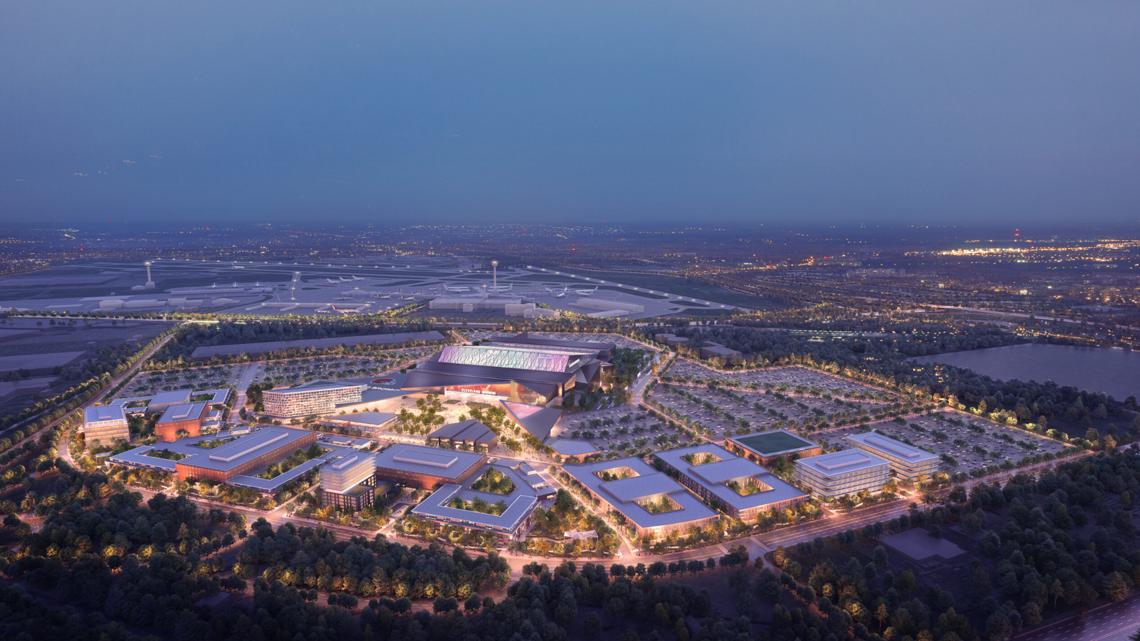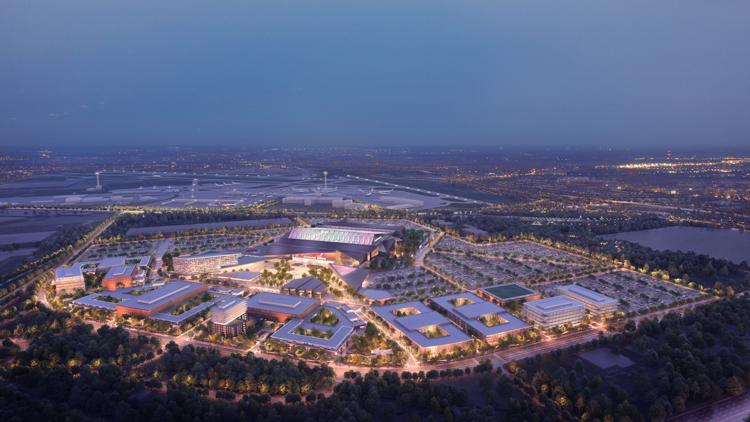

‘The Browns look forward to expeditiously resolving all of the parties’ claims in the litigation pending,’ the team’s attorney wrote of the ongoing stadium saga.
CLEVELAND — The Cleveland Browns have responded to Mayor Justin Bibb’s Dec. 30 letter calling for the Haslam Sports Group to make the team available for purchase by the city or private individuals as stated in the so-called “Art Modell Law.” Bibb has said that the city intends to invoke the Ohio law in an effort to keep the Browns from leaving downtown and moving into a new domed stadium in Brook Park.
In simple terms, the Browns told the city to get ready to battle in a court of law.
“The Browns understand that the City intends to assert legal claims in connection with those matters, as it has made clear in earlier public statements, and the Browns look forward to expeditiously resolving all of the parties’ claims in the litigation pending before the Honorable David Ruiz in the Northern District of Ohio,” wrote attorney Anthony C. White, representing the Browns.
In response, attorney Justin Herdman, representing the city of Cleveland, seemed to express frustration at the Browns’ short response to Bibb’s letter.
“The City is entitled to assurance that the Browns intend to uphold their contractual obligations, including complying with Ohio law,” Herdman wrote. “Rather than assure the City that the Browns intend to comply with their legal obligations, the Browns provided no meaningful response. The City has no choice but to read the Browns’ letter as a direct refusal to comply with their lease and Ohio law’s requirement to provide the City and local individuals with an opportunity to purchase the team. … This confirms for the City that the Browns (and its owners) are directly flouting duly-enacted Ohio law as well as the Browns’ contractual obligations to the City.
Herdman continued, “This all is deeply unfortunate.”
WHAT IS THE ART MODELL LAW?
The statue was passed by the Ohio General Assembly in 1996, a year after Art Modell moved the original Browns from Cleveland to Baltimore.
The entire statute from the Ohio Revised Code reads as follows:
“No owner of a professional sports team that uses a tax-supported facility for most of its home games and receives financial assistance from the state or a political subdivision thereof shall cease playing most of its home games at the facility and begin playing most of its home games elsewhere unless the owner either:
- Enters into an agreement with the political subdivision permitting the team to play most of its home games elsewhere;
- Gives the political subdivision in which the facility is located not less than six months’ advance notice of the owner’s intention to cease playing most of its home games at the facility and, during the six months after such notice, gives the political subdivision or any individual or group of individuals who reside in the area the opportunity to purchase the team.”
To Bibb and others sharing his position, the law applies just the same regardless if a team is merely moving one town over or to an entirely different state. As the Browns have played in the “tax-supported facility” that is Huntington Bank Field since returning to the NFL in 1999, the city believes local interests should now be afforded the opportunity to purchase the team rather than see the club move to Brook Park.
“Yet, to date, the Browns have not provided the City or others with the opportunity to purchase the team, as required by law,” Bibb wrote to the Haslams on Dec. 30. “And if that opportunity were provided, the City intends to take a leadership role in assembling an ‘individual or group of individuals who reside in the area’ in purchasing the team.”
The mayor concluded his letter by giving the Haslams until Jan. 9 (today) to respond to his demands. Had they refused (or perhaps provided “no meaningful response,” as Herdman alleged today), “the City intends to take appropriate legal action.”
You can read Mayor Bibb’s entire letter to the Browns and Haslams below.
HOW WE GOT HERE
With the lease on Huntington Bank Field set to expire in 2028, team owners Jimmy and Dee Haslam announced in March of 2024 that they were down to two options when it comes to their future stadium site: a $1 billion renovation to the existing downtown stadium, or a domed stadium outside of the city at double the cost. Word soon spread that the Haslams had optioned more than 170 acres of land in Brook Park near Cleveland Hopkins International Airport.
On Aug. 1, in what the city called “a competitive deal to retain the Cleveland Browns at their current stadium site,” Mayor Justin Bibb put forth a $461 million financing proposal to the Haslams to renovate the 25-year-old facility. The plan included a 30-year lease arrangement.
Six days later, the Haslam Sports Group unveiled renderings and video showcasing what a domed stadium complex in Brook Park would look like. In a letter, Jenkins referred to the idea of building $2.4 billion dome in Brook Park as a “transformational option” that will create “a modern, dynamic, world-class venue that would greatly enhance the fan experience and enable the State of Ohio and our region to compete for some of the biggest events in the world 365 days a year. Similar to other markets in the Midwest, this proposed domed stadium would catalyze our region in a major way.”
Less than a week later, Cuyahoga County leaders pounced on the proposal, arguing it “does not make fiscal sense” for citizens and taxpayers. County Executive Chris Ronayne urged the team to focus on renovating the current stadium, and stated that “any proposal that would create an unacceptable risk to the County’s general fund cannot be considered.”
On Oct. 17, the Browns confirmed their plans to move to Brook Park with plans including having an adjacent mixed-use development alongside the domed stadium. Team owners argued renovating the current stadium would not solve long-term issues, and that a domed stadium would allow them to host big events year-round and generate more revenue in the region.
In a press conference that same day, Bibb expressed his deep disappointment in the Haslam Sports Group’s decision, calling the team’s choice “frustrating and profoundly disheartening.”
“We have exhausted every single option to keep the browns in our city without compromising the general revenue of our city,” Bibb said during a press conference. “We remain committed to doing what we can to keep the Browns in Cleveland if Brook Park is not viable.”
One week after the announcement, the Browns filed a federal lawsuit asking a judge to declare the Modell Law, which requires any Ohio team playing in a tax-supported facility to give the city or locals the chance to buy the team, unconstitutional. Ohio Attorney General Dave Yost later filed a motion to intervene on the city’s behalf, which was granted.
“Nobody in this city can expect us to go away without a fight,” Cleveland City Council president Blaine Griffin said at the time. “So I’m glad that it’s in the courts, but it’s not going to stop us from being advocates for our city.”
In November, a Cleveland-commissioned study claimed Brook Park was not a viable option for the team. It found Brook Park would find it difficult to attract residents and retailers and also showed Cleveland would take a hit without a stadium, losing $30 million in economic activity and $11 million in tax revenue.
But a competing study commissioned by Haslam Sports Group found that while the move would close the door on the snowy types of home games, the Brook Park site would open the door to nearly 5,400 jobs and $1.2 billion in economic activity for Cuyahoga County.
While the Browns are preparing to go to court against the city of Cleveland, team representatives have been meeting with state and county officials to get funding assistance for their dome.
According to a spokesperson for Ohio Senate Minority Leader Nickie Antonio (D-Lakewood), the Haslam Sports Group is looking for the state to cover around $600 million of the $2.4 billion price tag. Some form of state assistance for a Browns stadium could come from the Ohio General Assembly later this year.
The Haslam Sports Group has previously stated its intention to pay $1.2 billion, which does not include another $1 billion for the entertainment district surrounding the stadium. The other $1.2 billion would come via public money, although a specific public-private funding plan has not yet been announced.
The Browns have not offered a specific proposal, according to state lawmakers, and new Senate President Rob McColley told the media Monday that he’s against a handout to the team.
According to Antonio, before the state offers any help, the legislature needs to figure out where they stand on providing financial aid to any sports stadium. Giving money to the Browns, she said, would likely prompt other Ohio sports teams to ask for help.
Antonio also said she stands with leaders in the city of Cleveland and Cuyahoga County and their efforts to keep Huntington Bank Field in downtown Cleveland.
“We’re going to continue to have a dialogue about what’s appropriate as it relates to any public expenditure in a new facility or a renovated facility,” Ronayne told 3News on Monday, the same day he met with the Haslam Sports Group.
3News’ Matt Rascon contributed to this report
